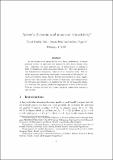Arrow's theorem and max-star transitivity

View/
Date
2009Author
Duddy, Conal
Piggins, Ashley
Metadata
Show full item recordUsage
This item's downloads: 588 (view details)
Recommended Citation
Duddy, C., Perote-Pena J., & Piggins A. (2009) "Arrow's theorem and max-star transitivity" (Working Paper No. 0140) Department of Economics, National University of Ireland, Galway.
Abstract
In the literature on social choice and fuzzy preferences, a central question is how to represent the transitivity of a fuzzy binary relation. Arguably the most general way of doing this is to assume a form of transitivity called max-star transitivity. The star operator in this formulation is commonly taken to be a triangular norm. The familiar max-min transitivity condition is a member of this family, but there are infinitely many others. Restricting attention to fuzzy aggregation rules that satisfy counterparts of unanimity and independence of irrelevant alternatives, we characterise the set of max-star transitive relations that permit preference aggregation to be non-dictatorial. This set contains all and only those triangular norms that contain a zero divisor.

